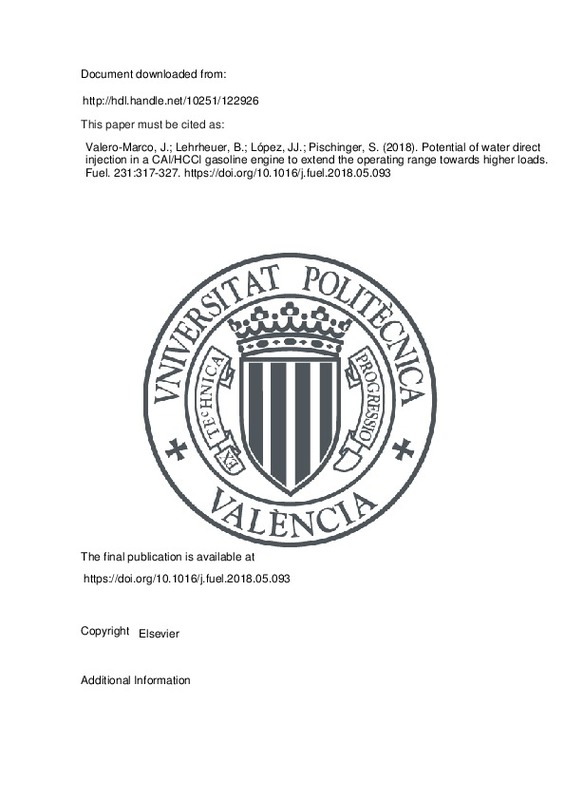JavaScript is disabled for your browser. Some features of this site may not work without it.
Buscar en RiuNet
Listar
Mi cuenta
Estadísticas
Ayuda RiuNet
Admin. UPV
Potential of water direct injection in a CAI/HCCI gasoline engine to extend the operating range towards higher loads
Mostrar el registro sencillo del ítem
Ficheros en el ítem
| dc.contributor.author | Valero-Marco, Jorge
|
es_ES |
| dc.contributor.author | Lehrheuer, Bastian
|
es_ES |
| dc.contributor.author | López, J. Javier
|
es_ES |
| dc.contributor.author | Pischinger, Stefan
|
es_ES |
| dc.date.accessioned | 2019-06-30T20:03:16Z | |
| dc.date.available | 2019-06-30T20:03:16Z | |
| dc.date.issued | 2018 | es_ES |
| dc.identifier.issn | 0016-2361 | es_ES |
| dc.identifier.uri | http://hdl.handle.net/10251/122926 | |
| dc.description.abstract | [EN] CAI (Controlled AutoIgnition) systems, also named HCCI (Homogeneous Charge Compression Ignition), are a promising way to improve gasoline engines. This combustion mode is more efficient than the standard SI (Spark Ignition) combustion and, additionally, it has very low emissions, especially NOx emissions, which represent a source of problems nowadays. The main problem of this combustion mode is the constrained operating range, caused, on the one hand, by the difficulty to ignite the fuel since it has to be auto-ignited by the control of the mixture reactivity, and, on the other hand, by its high heat release rates, causing high pressure gradients and, in some circumstances, knocking combustion. In this paper, the possibility to use directly injected water into the combustion chamber as a reactivity suppressor in order to extend the constrained load range of CAI operation is evaluated. For this study, a four-stroke single-cylinder gasoline engine has been modified to allow CAI combustion by means of adapted valve trains enabling to keep hot residual gases inside the cylinder, which will provoke the fuel autoignition. Additionally, a water direct injection system has been installed in the engine to carry out this study. The results show that water injection is an efficient strategy to increase the maximum affordable load in CAI conditions, since the reactivity of the mixture can be suitably controlled, thus reducing the pressure gradients and the knocking tendency of the combustion process, also keeping good levels of combustion stability. Nevertheless, the engine has to be significantly boosted and the necessary intake pressure compared to a conventional SI operation mode in stoichiometric conditions is much higher. | es_ES |
| dc.description.sponsorship | The research was performed as part of the Research Unit (Forschergruppe) FOR 2401 "Optimization based Multiscale Control for Low Temperature Combustion Engines", which is funded by the German Research Association (Deutsche Forschungsgemeinschaft, DFG). The support is gratefully acknowledged. The authors would like to thank also different members of the VKA institute for combustion engines of the RWTH Aachen university and CMT-Motores Termicos team of the Universitat Politecnica de Valencia for their contribution to this work and also thank the Universitat Politecnica de Valencia (contract 3102) and the Spanish Ministry of Economy and Competitiveness (contract BES-2016-077610) for financing the PhD. studies of Jorge Valero-Marco, partly funded by FEDER and the Spanish Government through project TRA2015-67136-R. | es_ES |
| dc.language | Inglés | es_ES |
| dc.publisher | Elsevier | es_ES |
| dc.relation.ispartof | Fuel | es_ES |
| dc.rights | Reconocimiento - No comercial - Sin obra derivada (by-nc-nd) | es_ES |
| dc.subject | Controlled autoignition | es_ES |
| dc.subject | CAI | es_ES |
| dc.subject | HCCI | es_ES |
| dc.subject | Water injection | es_ES |
| dc.subject | Operating range | es_ES |
| dc.subject.classification | MAQUINAS Y MOTORES TERMICOS | es_ES |
| dc.title | Potential of water direct injection in a CAI/HCCI gasoline engine to extend the operating range towards higher loads | es_ES |
| dc.type | Artículo | es_ES |
| dc.identifier.doi | 10.1016/j.fuel.2018.05.093 | es_ES |
| dc.relation.projectID | info:eu-repo/grantAgreement/AEI//BES-2016-077610/ | es_ES |
| dc.relation.projectID | info:eu-repo/grantAgreement/UPV//3102/ | es_ES |
| dc.relation.projectID | info:eu-repo/grantAgreement/MINECO//TRA2015-67136-R/ES/NUEVOS CONCEPTOS DE COMBUSTION PARA REDUCCION DE CONSUMO, CO2 Y EMISIONES CONTAMINANTES EN MOTORES DE GASOLINA PARA AUTOMOCION/ | es_ES |
| dc.rights.accessRights | Abierto | es_ES |
| dc.contributor.affiliation | Universitat Politècnica de València. Departamento de Máquinas y Motores Térmicos - Departament de Màquines i Motors Tèrmics | es_ES |
| dc.description.bibliographicCitation | Valero-Marco, J.; Lehrheuer, B.; López, JJ.; Pischinger, S. (2018). Potential of water direct injection in a CAI/HCCI gasoline engine to extend the operating range towards higher loads. Fuel. 231:317-327. https://doi.org/10.1016/j.fuel.2018.05.093 | es_ES |
| dc.description.accrualMethod | S | es_ES |
| dc.relation.publisherversion | https://doi.org/10.1016/j.fuel.2018.05.093 | es_ES |
| dc.description.upvformatpinicio | 317 | es_ES |
| dc.description.upvformatpfin | 327 | es_ES |
| dc.type.version | info:eu-repo/semantics/publishedVersion | es_ES |
| dc.description.volume | 231 | es_ES |
| dc.relation.pasarela | S\362904 | es_ES |
| dc.contributor.funder | Agencia Estatal de Investigación | es_ES |
| dc.contributor.funder | Ministerio de Economía y Competitividad | es_ES |
| dc.contributor.funder | Universitat Politècnica de València | |
| dc.contributor.funder | European Regional Development Fund |







![[Cerrado]](/themes/UPV/images/candado.png)

